![]()
Valerie Luyckx
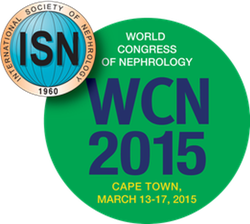 The recent International Society of Nephrologys (ISN) World Congress of Nephrology, was hosted by the South African Renal Society, in partnership with the African Association of Nephrology and the Renal Care Society of South Africa, in Cape Town South Africa in March 2015. The World Congress of Nephrology is a platform where for the global nephrology community to come together and exchange knowledge. The ISN is dedicated to improving kidney health, care of patients with kidney disease and the conduct of locally relevant research world-wide and especially has multiple programs which support nephrology activities in lower income countries through mentoring and partnerships with nephrologists and nephrology programs in high income countries.Participants in the ISN fellowship Program and the ISN Clinical research submitted abstracts and presented posters in a dedicated ISN Program Poster session.
The recent International Society of Nephrologys (ISN) World Congress of Nephrology, was hosted by the South African Renal Society, in partnership with the African Association of Nephrology and the Renal Care Society of South Africa, in Cape Town South Africa in March 2015. The World Congress of Nephrology is a platform where for the global nephrology community to come together and exchange knowledge. The ISN is dedicated to improving kidney health, care of patients with kidney disease and the conduct of locally relevant research world-wide and especially has multiple programs which support nephrology activities in lower income countries through mentoring and partnerships with nephrologists and nephrology programs in high income countries.Participants in the ISN fellowship Program and the ISN Clinical research submitted abstracts and presented posters in a dedicated ISN Program Poster session.
In partnership with The Open Urology and Nephrology Journal, the ISN is proud to present the winning abstracts to give a flavor of the richness and diversity of research being conducted by young nephrologists around the globe.
Congratulations to all the winners.
Winning WCN 2015 Abstracts
 |
Heme Oxygenase-1 Regulates Myeloid Cell Trafficking in AKI Dr Ahmed Kamal – Dr Ahmed Kamal from Egypt won the first prize as an ISN fellow for his work conducted at the University of Alabama. Dr Kamal investigated the role of heme-oxygenase-1 (HO-1) as a mediator of myeloid cell infiltration and migration in acute kidney injury (AKI) using knockout mice. Mice lacking HO-1 had greater trafficking of resident dendritic cells out of the kidney and impaired recovery and more fibrosis after AKI compared to wild-type animals. CLICK HERE TO READ THE ABSTRACT ON JASN |
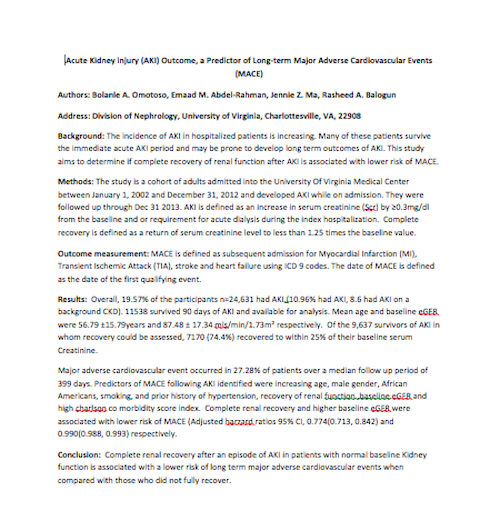 |
Acute Kidney injury (AKI) Outcome, a Predictor of Long-term Major Adverse Cardiovascular Events (MACE) Dr Bolanle Omotoso – The 2nd prize for an ISN fellow was awarded to Dr Bolanle Omotoso from Nigeria for her work, conducted at the University of Virginia, where she investigated the risk of long-term risk of major adverse cardiovascular events in patients who survived an episode of AKI. Dr Omotoso found that the risk of major adverse cardiovascular events was lower among those who had better renal function before developing AKI or who recovered more completely after AKI. CLICK HERE TO READ THE ABSTRACT |
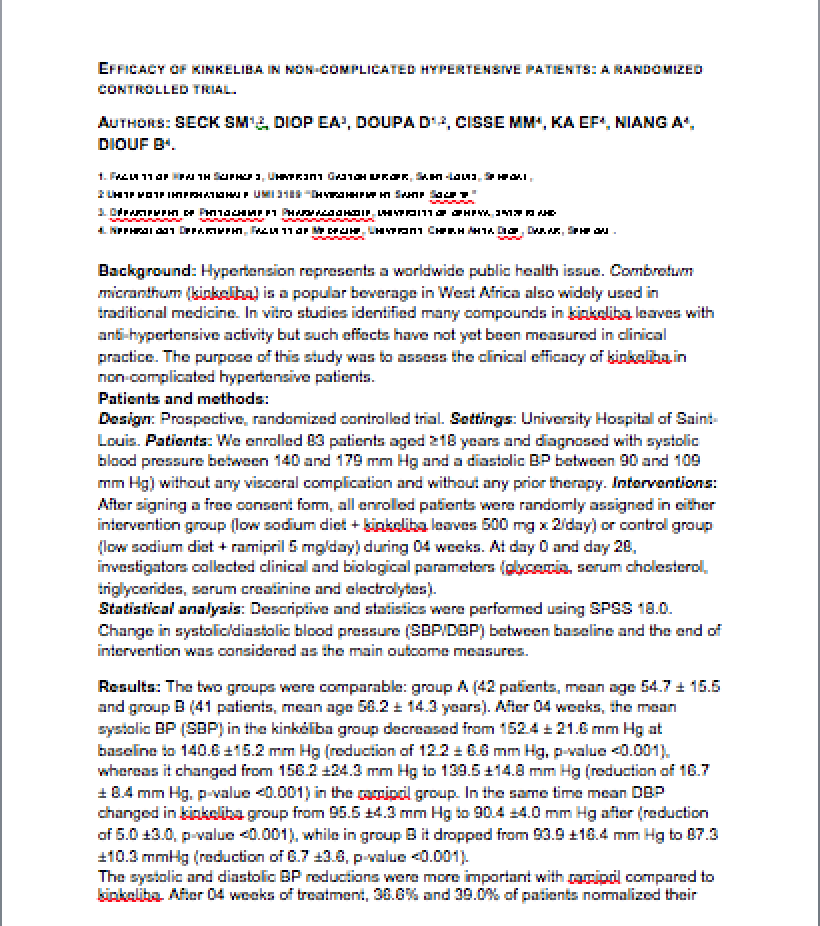 |
Efficacy of kinkeliba in non-complicated hypertensive patients: a randomized controlled trial. Dr Sidy Seck – In the ISN Clinical Research program category, the first prize was awarded to Dr Sidy Seck from Senegal for his work on the antihypertensive effect of the traditional medicine, Combretum micranthum (Kinkeliba), in comparison with Ramipril. Dr Seck showed that the improvement in blood pressure was numerically similar in Senegalese patients treated with Kinkeliba and Ramipril after 4 weeks. CLICK HERE TO READ THE ABSTRACT |
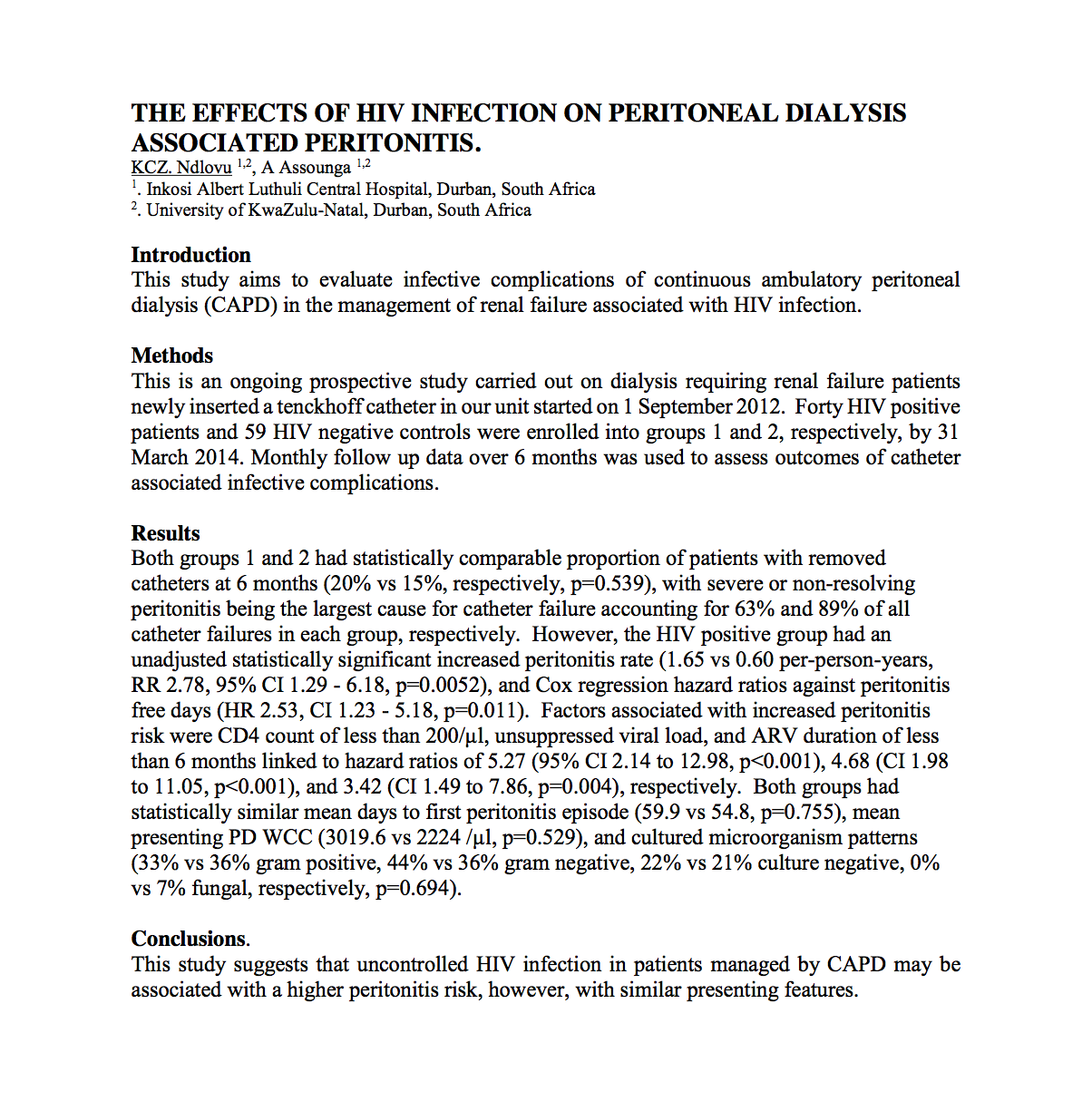 |
The effects of HIV infection on peritoneal dialysis associated peritonitis. The effects of HIV infection on short term outcomes among patients undergoing peritoneal dialysis Dr Kwazil Ndlovu – The second prize for Clinical research was awarded to Dr Kwazil Ndlovu from South Africa. Dr Ndlovu investigated the impact of HIV status on peritoneal dialysis outcomes and found that HIV positive patients have a high risk of peritonitis and rates of hospital admission compared with HIV negative patients, although mortality was not different. CLICK HERE to read the abstract “The effects of HIV infection on peritoneal dialysis associated peritonitis” CLICK HERE to read the abstract “The effects of HIV infection on short term outcomes among patients undergoing peritoneal dialysis” |
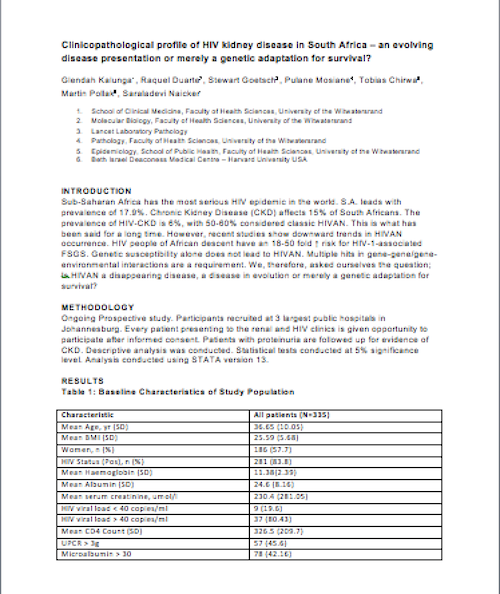 |
Clinicopathological profile of HIV kidney disease in South Africa an evolving disease presentation or merely a genetic adaptation for survival? Dr Glenda Kalunga – Dr. Glenda Kalunga from Zambia was awarded a joint 3rd prize for her work, conducted at the University of the Witwatersrand in Johannesburg, on renal histology in HIV patients with renal disease. Dr. Kalunga found an increasing heterogeneity of renal diagnoses among HIV positive patient in comparison with historical reports. All of these abstracts are highly relevant to clinical nephrology problems arising worldwide and contribute to the understanding of local disease and risk factors in resource limited settings. CLICK HERE TO READ THE ABSTRACT |
